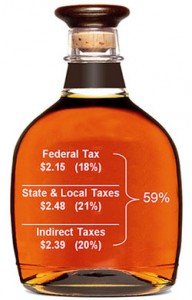
Taxes on Alcohol. When is it enough?
Alcohol is most certainly taxed enough. Worse yet, most in the industry duck their heads when the politicians and bureaucrats get out their calculators to figure out how to get more money from alcohol taxes. Of course this is nothing more than a consumer tax as it’s you and I and everyone else that purchases a bottle of wine, a six-pack of beer, or an incredibly taxed bottle of distilled spirit.
In my former city of Chicago citizens buying a bottle of their favorite Whiskey, Tequila, or Vodka are paying a number of taxes that amount to over half of the total price paid at the register.
It has for far too long been fashionable to go after alcohol to raise revenues for federal, state, and local governments with ever bloated budgets.
This week my spirits soared (pun intended) when I read Vice President of the Distilled Spirits Council of the United States Jay Hibbard’s letter to the editor of the Boston Globe. We need strong voices to make factual and reasoned responses to the ever-growing burden on consumers and hospitality industry imposed by government and then often misrepresented in the media. Bravo!
Here is the entire letter as printed by the Boston Globe on 9, March.
WHILE YOUR recent editorial arrived at the correct conclusion that Boston should not implement a hospitality tax that voters already overwhelming rejected (“Boston-only alcohol tax would be an unfair burden,” Feb. 27), there is additional economic evidence that should be considered.
First, the tax rejected in 2010 lasted only one year because voters witnessed the negative impact of double taxation on consumers and the hospitality industry. When the state imposed a sales tax on top of the excise tax for beverage alcohol, border stores lost 10 to 40 percent of their sales.
In addition, even conservative estimates project that the new tax would result in approximately $7 million in lost revenue for package stores in Boston. Moreover, Boston restaurants and bars wnould lose more than $3 million in revenue as a result of higher prices. More than 130 jobs would be lost in the process overall.
I take exception, however, to your notion that there is nothing “wrong with ‘sin’ taxes on items like alcohol.” Responsible consumption of distilled spirits, beer, or wine is a socially acceptable part of a normal, healthy, adult lifestyle. Alcohol taxes are not “sin” taxes; rather, they are hospitality taxes, and responsible businesses and consumers already pay their fair share. In fact, 47 percent of the retail price of a bottle of spirits in Massachusetts currently goes to a tax of some kind.
Boston consumers and the hospitality industry deserve to be heard by their representatives. The City Council should respect the will of the voters and reject the institution of a double tax on alcohol.
Jay Hibbard
Vice president
Distilled Spirits Council
of the United States
Washington
